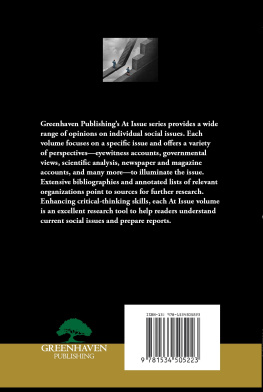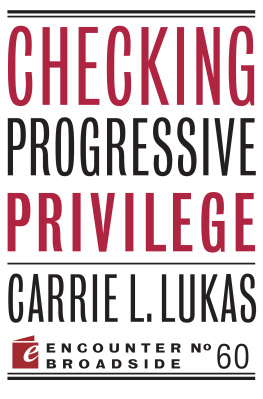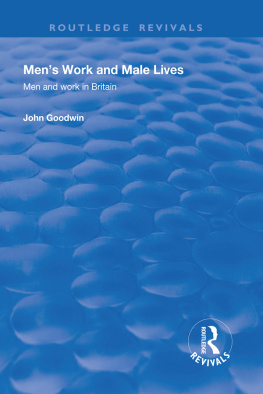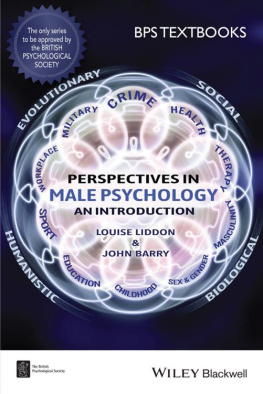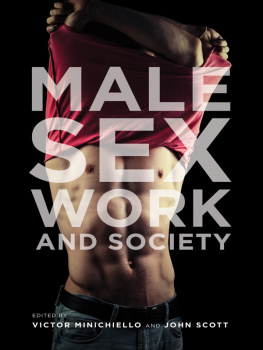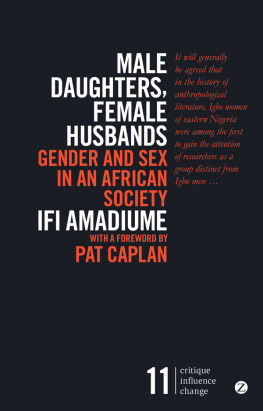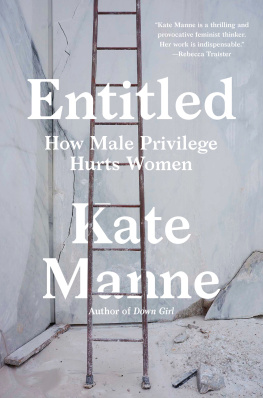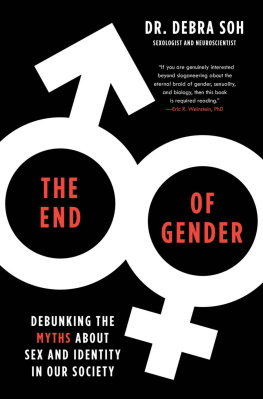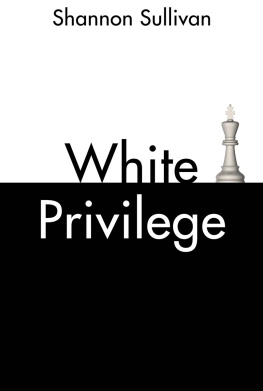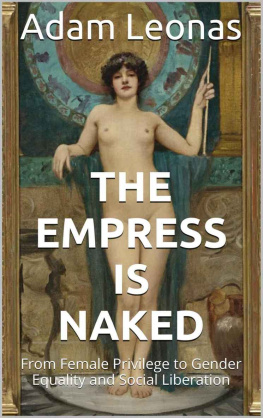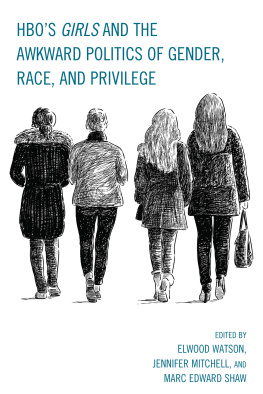

Male Privilege
Other Books in the At Issue Series
Americas Infrastructure
Celebrities in Politics
Ethical Pet Ownership
The Opioid Crisis
Political Corruption
Presentism
Public Outrage and Protest
The Role of Religion in Public Policy
Troll Factories
Vaping
Wrongful Conviction and Exoneration
Published in 2020 by Greenhaven Publishing, LLC
353 3rd Avenue, Suite 255, New York, NY 10010
Copyright 2020 by Greenhaven Publishing, LLC
First Edition
All rights reserved. No part of this book may be reproduced in any form without permission in writing from the publisher, except by a reviewer.
Articles in Greenhaven Publishing anthologies are often edited for length to meet page requirements. In addition, original titles of these works are changed to clearly present the main thesis and to explicitly indicate the authors opinion. Every effort is made to ensure that Greenhaven Publishing accurately reflects the original intent of the authors. Every effort has been made to trace the owners of the copyrighted material.
Cover image: Lightspring/Shutterstock.com
Library of Congress Cataloging-in-Publication Data
Names: Wenzel, Anna, editor.
Title: Male privilege / Anna Wenzel, book editor.
Description: New York: Greenhaven Publishing, 2020. | Series: At issue | Series: First edition | Includes bibliographical references and index. | Audience: Grades 912.
Identifiers: LCCN 2019000382| ISBN 9781534505216 (library bound) | ISBN 9781534505223 (pbk.)
Subjects: LCSH: Male domination (Social structure)Juvenile literature. | Privilege (Social psychology)Juvenile literature. | Sex roleJuvenile literature.
Classification: LCC HQ1090 .M3287 2020 | DDC 305.31dc23
LC record available at https://lccn.loc.gov/2019000382
Manufactured in the United States of America
Website: http://greenhavenpublishing.com
Contents
Derek Penwill
Ariane Hegewisch and Emma Williams-Baron
Elise Gould and Adriana Kugler
Sarah Schoppe-Sullivan
Colleen Clemens
TaLynn Kel
National Womens History Museum
Curriculum
Margaret Smith Crocco
Heidi Shin
Seema Jayachandran and Rohini Pande
Alex Fradera
Ronald Bailey
Leela Ginelle
Rebecca Shaw
Laura Liswood
Jo Scott-Coe
Harris OMalley
Usha Ram, Lisa Strohschein, and Kirti Gaur
Introduction
I n May of 2014, Time magazine published an opinion article written by Princeton University student Tal Fortgang titled Why Ill Never Apologize for My White Male Privilege. The piece condemns the idea that a characteristic like skin color or gender could play a significant role in determining the success an individual achieves in his or her life. While these factors may matter, Fortgang claims, it is ultimately hard work, determination, and intelligence that will get people where they want to be. To illustrate this, he refers to his penniless immigrant grandparents, who despite their destitution were able to make their way in America after enduring the horrors of World War II. To ask someone to check their privilege, then, is to dismiss their accomplishments and meritocracy itself. Fortgangs article elicited backlash in the form of critical opinion pieces and blog posts. Most of these were written by women (though men authored a fair number, as well) and picked apart Fortgangs argument against privilege. These women claimed to live in a completely different world; they had been passed over for jobs, harassed, and dismissed by their male peers due to their gender. To them, Fortgang did not understand his privilege because, as a white man, his life had never been significantly affected by it. These two perspectives, while not entirely representative of this extensive debate, warrant further investigation on the topic of privilege, its existence, and its reach.
The dialogue concerning male privilege did not begin with the watershed election of 2016 or even with Fortgangs article two years prior, but decades ago. Nevertheless, as the viewpoints in this volume and across the internet demonstrate, male privilege is a contemporary and controversial topic. At its core, privilege is a sociological concept. In terms of its popular usage, the best definition is the one provided by feminist scholar Peggy McIntosh: privilege Male privilege, specifically, concerns the belief that men are afforded economic, social, and political advantages in most societies. The idea of privilege, while not inherently complex, has been controversial since its first appearance in academic journals of the 1970s. Many men today (and a significant number of women) deny the existence of privilege. On the contrary, they believe that their successes in life were born solely out of their own hard work and personal merits, not because their gender was favored by a system. Even within the feminist camp, which believes this privilege exists, there is discourse over the extent of male privilege as it relates to race, gender identity, and sexuality, though this has fizzled out in recent years as fourth-wave feminism has brought intersectionality to the forefront.
The discussion regarding the existence and extent of privilege is at the crux of this volume. Additionally, readers will become familiarized with real-life experiences that are perceived to be the result of male privilege. The gender pay gap, the preference for sons over daughters across the world, and the distinctly male slant of history taught in schools today are all problems that could be seen as a result of the systemic favor shown to men. On the other hand, as critics of male privilege would argue, they may just be unrelatedif unfortunateoccurrences.
Despite its current relevance, privilege is not a new concept. Marginalized groups have been aware of and fought against their own disadvantages for centuries. Women across the world rallied for equal rights on the historic battlegrounds of public streets and political congresses as early as the nineteenth century. However, it was during the second wave of feminism in the 1970s that the concept of privilege formally entered the academic sphere and the broader social conscience. Male privilege was at the center of this movement, which turned a critical eye towards discrimination against women in the workplace and unequal division of labor within the home. Second-wave scholarship also expanded to include different layers of privilege and oppression, like those based on race and sexuality, and how those affect an individuals experience. These ideas continue to evolve even today.
Much of todays activism concerning the eradication of male privilege is focused on timely topicsthe portrayal of women in the media, sexual harassment and assault, and the beauty industry and for good reason. However, the effects of male privilege on men, especially in the form of toxic masculinity and violence, are underrepresented in much of the literature on the topic. These experiences serve as an important reminder of how male privilege is believed to extend to all spheres of society. Equally vital are the specific types of privilege afforded to men who are members of marginalized groups. For instance, the struggles faced by a black man, who benefits from his gender but not his race, are different from those faced by a black woman, who may experience discrimination based on both her race and her gender. This concept is called intersectionality, as it deals with what occurs at the intersection of multiple disadvantages. It is important to also keep in mind the nuanced differences in gender relations across cultures, as the concept of privilege is strongly entwined with culture and manifests in different ways in different countries, though the overarching themes of oppression and privilege are transferable across borders.
Next page
